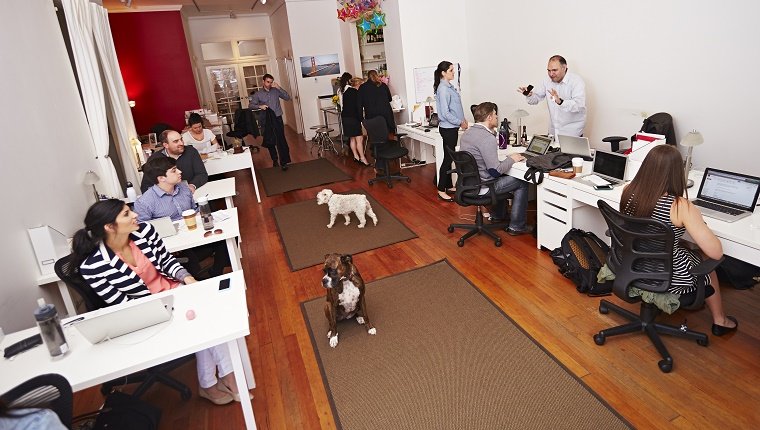
Businesses small and large are literally going to the dogs as furry friends are being welcomed into the workplace more and more often. This trend started soon after what might be considered the most famous study on what impact dogs have on employees, published in a 2012 edition of the International Journal of Workplace Health Management and conducted by researchers at the Virginia Commonwealth University Center for Human-Animal Interaction.
The research found multiple benefits for employees who were able to bring their dogs with them to work, and those benefits were consistent regardless of the field the employee worked in, from sales and marketing to blue-collar positions such as manufacturing.

It revealed that employees who brought their dogs with them to work had significantly lower stress levels throughout their work day, and even co-workers that weren’t accompanied by their own pet felt that the presence of the dogs had a positive impact on their productivity. One of the study authors, Dr. Randolph Barker, PhD, is a Professor of Management at the VCU School of Business. The appropriately named Dr. Barker reported that the dogs became “a social lubricant. Employees who normally didn’t talk to each other suddenly felt a connection and became part of a team.”
Dogs in the workplace have a way of bringing people together, critical for being both interactive and productive. The option of being able to bring a pet to work can also be an effective recruiting tool, especially with millennials.

Workplace perks that attract this group often include flexible working hours and on-site amenities. Millennials tend to marry later and delay having children until they establish their careers, so many have pets in their homes to provide companionship. Progressive companies have made allowing pets in the workplace a part of their culture and have found that the benefits greatly outweigh any drawbacks. Offering the “Pet Perk” has actually helped them to attract more and better talent to their businesses.

In a recent survey of fifty companies that welcome pets, employers agreed that they saw lower stress levels and had less absenteeism than when they operated as a pet-free work force. Productivity and employee morale also got a boost, and employees were more willing to work overtime and longer hours, free from the worry of getting home in time to care for their dog. People who work long hours often hesitate to get a pet because they realize the animal will be forced to spend many hours home alone, but that barrier is removed if the dog can come with them to their workplace. It’s a win-win solution, and it could end up helping more animals find loving homes.
Dr. Barker found that the most unexpected result is how pets in the workplace help employees interact. They’re a natural conversation starter, and co-workers frequently bond over a dog.

Employees who can bring their pet to the office save money on doggie day care and walking services, and because the employee or a co-worker walks the dog during the day, a little exercise with fresh air and a refreshing break are provided for the walker, as well as for the dog. Those few minutes away from the desk or project increase productivity. Employees who have their dog at work are more willing to extend their hours until their work is completed.

Nationally, Take Your Dog to Work Day is celebrated on the first Friday after Father’s Day in June, but why limit the fun to a single day? Companies are beginning to understand that a pet-friendly office attracts more productive and engaged employees. Sure, there are drawbacks like accidents on the floor and some noise problems, but these can be managed with well-trained dogs and aware owners. Companies that consider allowing dogs in the workplace can draft a policy and set some basic guidelines.

Employers should make sure there are readily accessible outdoor areas for “dog breaks” and interview the animal – yes, really – to be sure behavior is acceptable. Aggressive or fearful dogs may not adapt well to an office environment. The dogs should be clean, free of illness and up-to-date on vaccines. Take a look at office layout and decide on policy to keep the pets in specific areas leashed, confined with use of baby-gates, or even in a crate. Basic training is a must, and barking dogs need to be curbed. Consider how the dog adapts, as well, checking for signs of stress that might indicate the office environment doesn’t work for him or her. Keep a dog-free zone available for any employee who has allergies who is frightened by dogs.

Realizing how beneficial and important a dog-friendly office is for their employees, some companies have even expanded on the idea and offer additional perks including free vet wellness check-ups, pet health insurance, and paid bereavement leave for those who lose a pet.

Would you be more productive and happy in a workplace that allows dogs? Does your office let you bring your pup to work? Let us know in the comments below!
Related Articles:
7 Ways To Make Your Office Dog Proof For Take Your Dog To Work Day
Take Fido To The Office This Take Your Dog To Work Day








